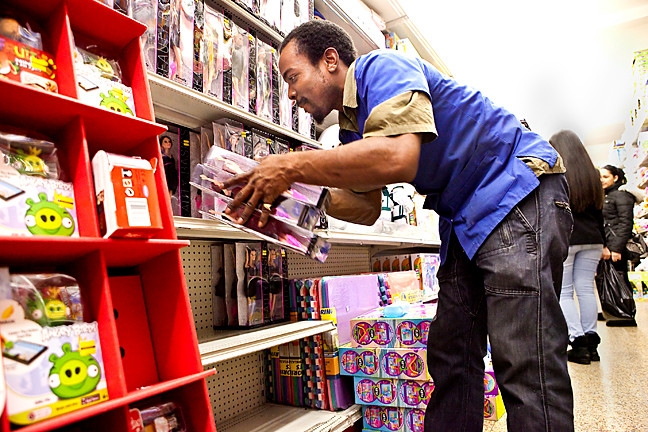Workers mull raising the minimum wage
Last year, co-Majority Leader Jeff Klein pushed Speaker Sheldon Silver’s bill to raise the state’s minimum wage from $7.25 to $8.50 per hour. In early January, Gov. Andrew Cuomo one-upped the legislature, proposing $8.75. Then, in his State of the Union address last week, President Barack Obama raised the stakes again, calling on Congress to increase the federal minimum wage from $7.25 to $9 per hour.
That was music to the ears of low-wage earners in the Riverdale/Kingsbridge area.
“I’m excited. I can’t wait. It would help a lot,” said Romaine Gray, 28, as he placed dolls on the shelves at Lot Less Closeouts on Broadway in Kingsbridge. “Right now, you work just to pay bills, it’s hard to put food on your table.”
Though not many had heard about the state’s push to raise the minimum wage, word on Mr. Obama’s $9 per “My friend called to tell me,” said Brenda Kwarteng, 23, a cashier at Rite Aid in Marble Hill.
Everyone interviewed said any increase would help pay bills and buy essentials like food, though a few said a bump in their take home pay would mean money to spend on other things.
Ms. Kwarteng said she’d like to help pay for her brother to go to college. Mr. Gray said that his hours had been reduced from 40 to 34 per week, and that it’s forced him to think about applying for food stamps. He said he might be able to do without them if he got a bump in his take-home pay.
“I’d be able to save a little bit,” said Roque Ortiz, 40, a Kingsbridge resident who makes $8 an hour stocking shelves at C-Town on Broadway.
Just because Mr. Obama called on congress to raise the federal minimum wage does not mean New York is giving up. After Mr. Obama’s announcement, Mr. Silver amended his legislation to reflect the president’s figure of $9 per hour. It is unclear if Mr. Klein will still support $9, but after Mr. Obama’s speech he released a statement saying the state should still act to raise the minimum wage since Congress is unlikely to pass a wage-increase bill.
“If congress has the courage to raise the federal minimum wage, millions in our country, from workers to business owners, stand to benefit. But if recent history is any guide, we cannot depend on congress to build consensus around important economic decisions. That’s why we need to seize the moment here in New York to provide our state’s working families with a sensible raise that they so desperately need,” Mr. Klein said in a statement.
Mr. Klein also said he planned to make increasing the minimum wage his top legislative priority. Though co-Majority Leader Dean Skelos has been vocally opposed to raising the minimum wage in years past, in early February at a forum in Manhattan, he said he was open to raising it.
“Last year, the economy was in such a fragile state that it was the wrong time to do it,” Mr. Skelos said, according to news reports. “What I think can be done this year — the economy is improving — is we can have a serious discussion if there’s a way to implement it.”
Hours before Mr. Obama’s State of the Union, Mr. Klein’s Independent Democratic Conference released a study outlining the benefits of raising the minimum wage, especially for women and minorities.
“A lot of these low-wage workers are mothers and fathers who’ve come here to pursue the American Dream. But if these folks come here, work hard, and still can’t afford to fill their family’s refrigerator, how can we hope to grow our state’s economy?” Mr. Klein said in a statement.
According to the IDC report, 56 percent of state workers who would be affected by a minimum-wage increase are women, while 44 percent are men. Though the total estimated workforce of New York is 16 percent Hispanic and 13 percent black, among those who would see their pay increase, 25 percent are Hispanic and 15 percent are black.
The IDC reported that an increase in the minimum wage from $7.25 to $8.50 would mean $950 million in new wages with an expected $600 million increase in statewide spending. A person making the current minimum wage and working 40 hours per week for 52 straight weeks earns $15,080 before taxes.
While Mr. Klein and supporters of the bill argue that increasing the minimum wage would help businesses by giving low-wage earners more expendable income, opponents say it will be devastating to businesses.
“We need to improve New York’s economy and create good-paying private sector jobs. Raising the minimum wage will not do that. It would increase the cost of doing business for affected employers,” Heather Briccetti, president and CEO of The Business Council of New York State, Inc., said in a press release last week.
Ms. Briccetti said an increase in the minimum wage would add a direct cost of between $3,000 and $4,000 per employee, which would result in layoffs and reduced hours for workers and which word force retailers to raise their prices.
Mr. Ortiz at C-Town said he feared that if his hourly pay were increased, his cost-of-living might rise with it.
Niyely Then, 21, who makes $7.25 per hour working the drive thru at Dunkin Donuts at West 230th Street, said she thought it would be “awesome” for the economy.
“We could do a lot more with that money,” she said. “The economy will raise up because we will buy more.”






